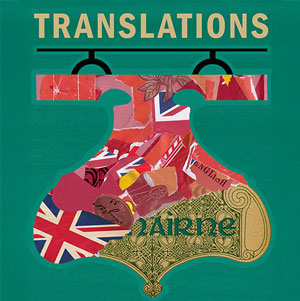
 rating=4]Ryan Drummond stars as a Martian in the one-man stand-up comedy routine “Men Are From Mars, Women Are From Venus”, based on the original 1992 pop-psychology book by author John Gray. This Broadway in Chicago production, directed by Mindy Cooper, takes Gray’s original observations and transforms them into a two-hour comedy routine: in this case, based on Drummond’s marriage to his wife Katy. The joy of watching Drummond’s highly energetic presentation is that he explores male and female differences and how these can influence how men and women relate to each other as part of being a heterosexual couple. His delivery is a hoot: He is dynamic and engaging. He changes voices when he acts the part of his wife and sings from time to time. Moreover, the points he makes in his monologue are occasionally buttressed by videotapes, featuring Gray as the seeming expert who uses animations to enhance his argument: namely, that men and women are fundamentally different creatures, as if they originated on two different planets. He contends that for a marital relationship to be lasting, we need to understand these basic differences in needs and temperament between the sexes.
rating=4]Ryan Drummond stars as a Martian in the one-man stand-up comedy routine “Men Are From Mars, Women Are From Venus”, based on the original 1992 pop-psychology book by author John Gray. This Broadway in Chicago production, directed by Mindy Cooper, takes Gray’s original observations and transforms them into a two-hour comedy routine: in this case, based on Drummond’s marriage to his wife Katy. The joy of watching Drummond’s highly energetic presentation is that he explores male and female differences and how these can influence how men and women relate to each other as part of being a heterosexual couple. His delivery is a hoot: He is dynamic and engaging. He changes voices when he acts the part of his wife and sings from time to time. Moreover, the points he makes in his monologue are occasionally buttressed by videotapes, featuring Gray as the seeming expert who uses animations to enhance his argument: namely, that men and women are fundamentally different creatures, as if they originated on two different planets. He contends that for a marital relationship to be lasting, we need to understand these basic differences in needs and temperament between the sexes.
Comedians typically rely on tropes to rope in an audience, and of course, I expected some amount of stereotyping, exaggeration, and generalization when discussing the male energy of Mars versus the female energy of Venus. In that vein, Drummond does not disappoint. He punctuates Gray’s pseudoscientific principles with examples taken from his own life. For instance, he refers to his own marriage when he describes a night at the opera: when he constantly uses his phone to check sports scores while his wife continually checks in with their babysitter. He explains how a man wants to fix things to show his concern and love, whereas a woman wants her man to express his feelings and ask questions. For men “bigger is better” when it comes to demonstrating affection, whereas for women, love is demonstrated when a man does a multitude of smaller, considerate acts on a more regular basis. Drummond (in his case-study of one) explains how he took his wife to a paradisal hotel with a gorgeous infinity pool, and yet she took that very moment to ask him, “Do you really love me?”
Herein lies a problem with the underlying material: According to Drummond, the bottom line is that a man needs trust and appreciation (a/k/a T&A) whereas a woman needs attention and understanding a/k/a AU, the chemical symbol for gold. But perhaps there is quite a bit more underlying Katy’s question: Perhaps she really means: “Do you really think you can buy me with gold?” And more explicitly: “Do you love me for the individual I am and not as a stereotype of the woman whom you would like me to be?” As for myself (as a woman writing this article), it was obvious that the script was written by a man! Now I’m doing the sexist stereotyping!
Another distinction being made in this show between Mars and Venus has to with generalizing about a couple’s respective roles. The example given is how a woman might react when her husband vacuums the house. The woman is grateful that her husband has done this task, and that is because it is not typical within his traditional male role. But then turn it around; and if a man thanks a woman for vacuum cleaning as part of her traditional female role, then she might become resentful. His praise is being looked upon as patronizing and insulting. In gender-neutral terms, this relates to what is called “the reciprocity of gratitude.” What this means is that in any relationship (regardless of a person’s gender or sexual orientation), people want to be praised for what they consider to be significant, meaningful, or well done rather than what they consider to be trivial, ordinary, or poorly accomplished. So while Gray and Drummond see this issue through the periscope of what it means to be male or female, I see it in terms of power relations: getting somebody else to do necessary work that one might not otherwise choose to do for themselves. In a piece of cleverly done animation, we see a woman picking up her husband’s dirty underwear from the floor and scoring points in her own mind for doing so; this as a means of keeping their relationship together. I would argue that having to pick up someone else’s underwear is not necessarily a female job but indicative of a power differential, because it’s just as easy to put the underwear into a hamper than to intentionally make the other spouse pick it up.
Unfortunately, the distinctions being made between Mars versus Venus are much too static. Couples can and do change and evolve over the life course. Except for the small mention of the babysitter, nothing is said about family dynamics or about how having and raising children can affect Venus versus Mars energies. Yet Drummond states that it is important as life goes on to keep the relationship interesting so that the couple will stay together. That’s one of the moments when he addresses the men in the audience and tells them that to avoid divorce, they may need to “ride the tsunami” of a partner’s needs and wants and that this is not easy to do. But from my perspective, the couple has to change not just because one’s partner might get into certain moods or have certain wants or whims. It’s not just about two people alone to the exclusion of everybody else. Rather, as our overall culture and society change over time—or even as our daily lives change with stresses and strains having to do with personal finances or family matters—all these forces may affect how romantic partners relate to each other.
Thus the show would have worked better thirty years ago when Gray’s original book first came out: a time when there was less fluidity regarding male and female roles in our culture. While some portion of Drummond’s (and Gray’s) observations may still hold true in American society nowadays, there have been significant cultural changes in the intervening years regarding how people view sex, gender, dating, and marriage. Today there is probably a lot more negotiation as to which roles are being taken on by each partner within the loving couple, and these have less to do with innate biology and more to do with individual differences regarding strengths, weaknesses, and interests—and what works for one couple may not work for another. In fact, the performance never touches upon individual differences within a loving partnership or consider that every marriage is different. Nothing is mentioned regarding what people bring to the relationship, such as their talents, skills, intelligence, worldly experience, or family or religious background—and also their differences from the onset.
When I visited this Broadway in Chicago production on opening night, Drummond was the understudy for the headliner Amadeo Fusca. Afterwards, I wondered how Fusca’s presentation may have differed from Drummond’s, considering that each man has presumably had quite different experiences as being part of a loving couple. While Drummond’s presentation is amusing, my biggest disappointment is that he portrays women as being far too whiney and vain—and those of both sexes as being too self-centered and superficial. That said, this type of comedy might appeal more to seniors and those in committed relationships who conform to traditional sex and gender roles in mainstream America.
Towards the end of the show, we see a video of John Gray once again discussing how men and women differ as to how they assess the value of their loving relationship using the example of amassing points. In keeping with previous sports analogies, this, to me, seemed like a rather “male-oriented” way for a man to view his relationship with his significant other. To my mind, the value that another person sees in us should have less to do with how many points that we can rack up for doing loving actions for them—and more to do with shared values and whether both partners are still playing in the same league. In the last analysis, every relationship is unique. Venus and Mars may be in the American psyche, but some couples may be more aptly governed by Saturn and Mercury.
“Men Are From Mars, Women Are From Venus, Live!” is playing through February 19, 2023, at the Broadway Playhouse at Water Tower Place, 175 E Chestnut Street, Chicago.
Tickets range from $26 to $65.50 (through Ticketmaster), price depends on date, seat location, and applicable fees.
Performance Schedule:
Tuesday, Wednesday, Thursday, Friday – 7:30 p.m.
Saturday – 2:00 and 7:30 p.m.
Sunday – 2:00 and 6:00 p.m.
For more information and to purchase tickets, visit: https://www.broadwayinchicago.com/show/men-mars-23/.
Note that the box office cannot take phone orders. To order tickets by phone, please call 800-775-2000.
For groups of 20 or more, call (312) 977-1710.
For general information and to find out about Broadway in Chicago’s other offerings, go to https://www.broadwayinchicago.com/ or phone the box office at 312-977-1700.
“All guests are recommended to wear a mask in the theatre, however masks and proof of vaccine are no longer required. There are no refunds or exchanges unrelated to COVID Protocol.”
See: https://www.broadwayinchicago.com/covid19/ for additional details. Note that protocols can change at any time.
To see what others are saying, visit www.theatreinchicago.com, go to Review Round-Up and click at “Men Are From Mars, Women Are From Venus, Live!”.
NOTE: On opening night, the performance was done by the understudy due to health reasons. If you heard the interview on Around The Town with Al Bresloff on WCPT, Amadeo Fusca will be back in the role he has done for many years.It is he pictured above.






More Stories
“Translations”
“The Firebugs” reviewed by Julia W. Rath
“The Book of Grace” Al Bresloff with another from Paul LIsnek